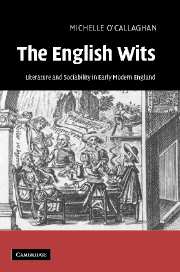Book contents
- Frontmatter
- Frontispiece
- Contents
- Acknowledgements
- Note on the text
- Introduction
- Chapter 1 Gentleman lawyers at the Inns of Court
- Chapter 2 Ben Jonson, the lawyers and the wits
- Chapter 3 Taverns and table talk
- Chapter 4 Wits in the House of Commons
- Chapter 5 Coryats Crudities (1611) and the sociability of print
- Chapter 6 Traveller for the English wits
- Chapter 7 Afterlives of the wits
- Notes
- Bibliography
- Index
Chapter 3 - Taverns and table talk
Published online by Cambridge University Press: 22 September 2009
- Frontmatter
- Frontispiece
- Contents
- Acknowledgements
- Note on the text
- Introduction
- Chapter 1 Gentleman lawyers at the Inns of Court
- Chapter 2 Ben Jonson, the lawyers and the wits
- Chapter 3 Taverns and table talk
- Chapter 4 Wits in the House of Commons
- Chapter 5 Coryats Crudities (1611) and the sociability of print
- Chapter 6 Traveller for the English wits
- Chapter 7 Afterlives of the wits
- Notes
- Bibliography
- Index
Summary
Clubbing and commoning at the Inns of Court drew on a classical tradition of banqueting literature represented by texts such as Xenophon's Symposium and Plutarch's Table Talk. The revels were structured around great feasts: the frugal, spare diet of the commons gave way to sumptuous, rich banquets to celebrate the pleasures and plenitude of communal life and the liberality of the Inns. The revels were extraordinary events; even so, the everyday routine of the Inns was structured by rituals of eating together in the commons, a quotidian ‘symbolisation of community, of bonding’ that, as Peter Goodrich notes, was vital to maintaining and perpetuating the professional homosociality of the Inns. Pedagogic exercises, such as readings, mootings and disputations, were undertaken either during or after meals. This conflation of bodily and intellectual nourishment attests to the commons' proximity to the classical convivium, which similarly encompassed living, drinking and eating together, and the exercise of the intellect at the table. Sharing food and drink had a civilising effect, integrating the individual into the humanist community. Plutarch spoke of the ‘friend-making character of the dining table’, and the value of table talk since ‘learned discussions’ are stimulated by ‘company’ with the ‘table and goblet before us’. The mouth, the organ of both eating and speaking, was the source of numerous analogies relating the intellectual pleasures of conversation to the sensual pleasures of eating and drinking.
- Type
- Chapter
- Information
- The English WitsLiterature and Sociability in Early Modern England, pp. 60 - 80Publisher: Cambridge University PressPrint publication year: 2007

